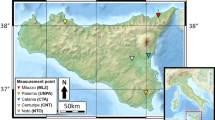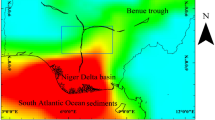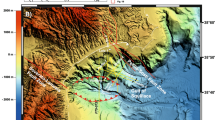Abstract
DURING the past two years, sixty-six new gravity stations were established, using the Imperial College Worden gravity meter, on the islands of Rhum, Eigg, Canna and Sanday in the Inner Hebrides. Local bases on the islands were linked to Pendulum House, Cambridge, through the Mallaig gravity base established by Bullerwell and Phemister (private communication). The results were reduced to the International Gravity Formula, and after correction for terrain effects, the Bouguer anomalies were plotted as a gravity contour map (Fig. 1).
This is a preview of subscription content, access via your institution
Access options
Subscribe to this journal
Receive 51 print issues and online access
$199.00 per year
only $3.90 per issue
Buy this article
- Purchase on Springer Link
- Instant access to full article PDF
Prices may be subject to local taxes which are calculated during checkout
Similar content being viewed by others
References
Cook, A. H., and Murphy, T., Measurements of Gravity in Ireland (Dublin Inst. Adv. Studies, Geophys. Mem. No. 2, Pt. 4, 1952).
Tuson, J., Ph.D. thesis.
Author information
Authors and Affiliations
Rights and permissions
About this article
Cite this article
MCQUILLIN, R., TUSON, J. Gravity Measurements over the Rhum Tertiary Plutonic Complex. Nature 199, 1276–1277 (1963). https://doi.org/10.1038/1991276a0
Issue Date:
DOI: https://doi.org/10.1038/1991276a0
This article is cited by
-
A large explosive silicic eruption in the British Palaeogene Igneous Province
Scientific Reports (2019)
-
Mineral-scale Sr-isotope constraints on magma evolution and chamber dynamics in the Rum layered intrusion, Scotland
Contributions to Mineralogy and Petrology (2003)
-
Geochemical evolution during fractional crystallisation of a periodically refilled magma chamber
Nature (1977)
-
Deep Structure beneath the Tertiary Volcanic Regions of Skye, Mull and Ardnamurchan, North-west Scotland
Nature Physical Science (1973)
-
Geological Structure in the Sea of the Hebrides
Nature Physical Science (1973)
Comments
By submitting a comment you agree to abide by our Terms and Community Guidelines. If you find something abusive or that does not comply with our terms or guidelines please flag it as inappropriate.



